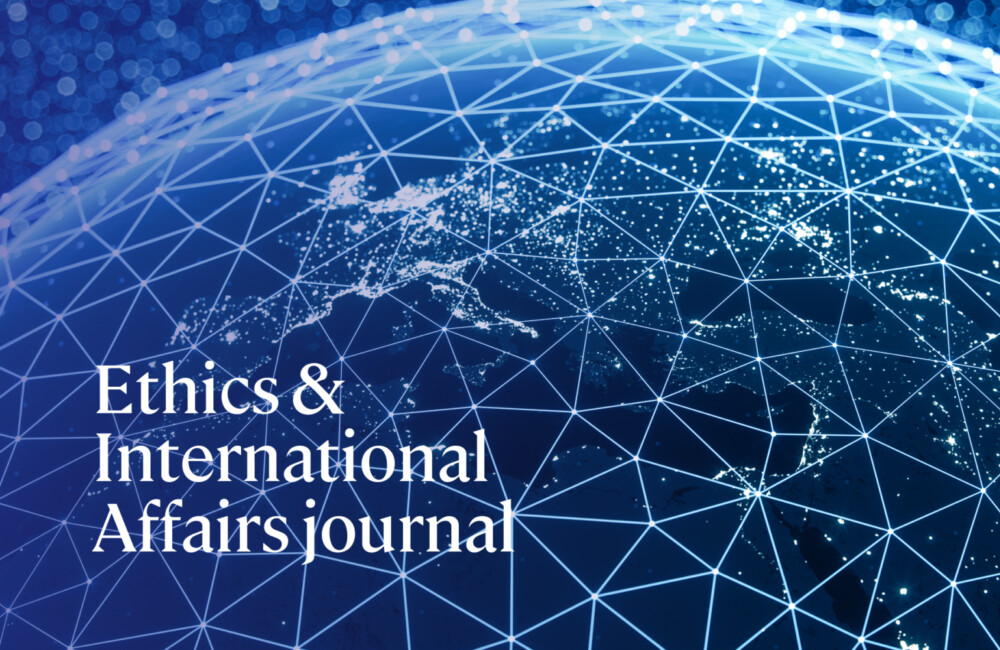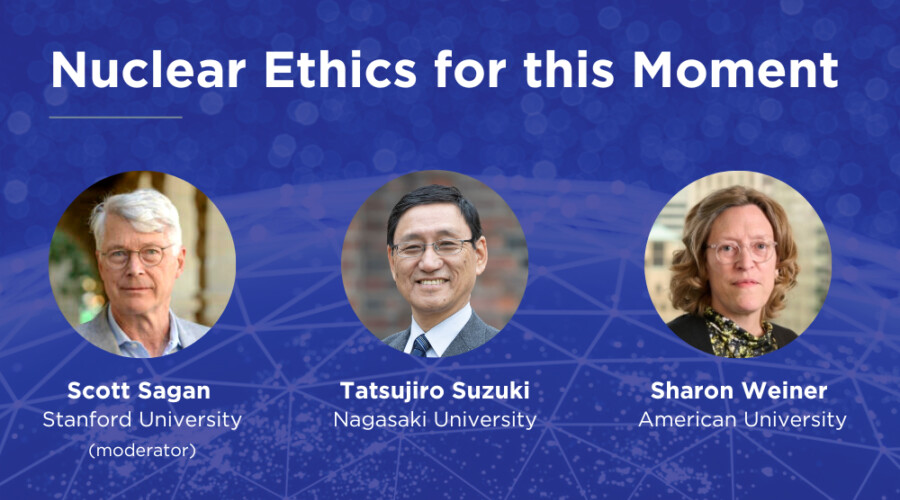The following is a list of Council resources related to the articles in Ethics & International Affairs, Volume 21.3, Fall 2007.
ECOLOGICAL INTERVENTION: PROSPECTS AND LIMITS
Robyn Eckersley
An Incomplete Victory at Ok Tedi
Stuart Kirsch, University of Michigan
Litigation has been successfully utilized in combating corporations that contribute to environmental degradation in developing communities. However, the success of this approach is often tarnished by an absence of effective environmental remediation and local development strategies. (Human Rights Dialogue, Volume 2.2, Spring 2000)
Learning from Environmental Justice: A New Model for International Environmental Rights
Hari M. Osofsky, University of Oregon School of Law
The human rights consequences of environmental harms lie at a complicated legal intersection that poses several problems of characterization. This is a result of the absence of a unified stance within international law regimes. Therefore, a new model must be created in order to understand the complex relationship between human rights and the environment. (Originally published in the Stanford Environmental Law Journal, Summer 2004)
The Human Rights of the Sukan Al-ahwar (Marsh Arabs of Iraq)
Baroness Emma Nicholson of Winterbourne, House of Lords & European Parliament
Saddam Hussein's destruction of the Sukan Al-Ahwar marshes in southern Iraq has impacted both the local environment and the human rights of the indigenous population. His brutally systematic approach has been labeled as genocide and deserving of intervention in order to protect a valuable natural resource and save an ancient culture. (Article, October 2004)
Can Cultural Values Save the Environment?
Joel H. Rosenthal, Carnegie Council; Joanne Bauer, Business and Human Rights Resource Center; Dale Jamieson, New York University; Keith Kloor, Audubon Magazine; Guobin Yang, Barnard College; Richard Franke, Montclair State University
This forum is the culmination of a multi-year project that sought to critically address ethics and the global environment. The resulting work, Forging Environmentalism, is an important collaborative effort that pushes the frontiers of research in environmental ethics. (Panel Forum, September 2006)
POVERTY AND GLOBAL JUSTICE
Nancy Kokaz
More Than Charity: Cosmopolitan Alternatives to the "Singer Solution"
Andrew Kuper, Leapfrog Investments
Andrew Kuper argues that poverty is the result of the exclusion of the poor from economic arrangements. Charity alone is insufficient to remedy this situation. Eliminating poverty requires a multifaceted approach that addresses these complex economic interrelationships. (Ethics & International Affairs, Volume 16.1, Spring 2002)
Poverty, Facts, and Political Philosophies: Response to "More Than Charity"
Peter Singer, Princeton University
Despite Andrew Kuper's assertions, Peter Singer contends that mass charity is the most effective way to remedy poverty. He believes that this approach has the most potential for eliminating global poverty and should be considered as a realistic and effective strategy. (Ethics & International Affairs, Volume 16.1, Spring 2002)
Economic Justice in an Unfair World: Toward a Level Playing Field
Joel H. Rosenthal, Carnegie Council; Ethan B. Kapstein, INSEAD
In a lively session, Ethan Kapstein proposes just what the international community can reasonably do to build a global economy that will be fairer to all. (Public Affairs Lecture, November 2006)
The End of Poverty: Economic Possibilities for Our Time
Jeffrey Sachs, Columbia University
Jeffrey Sachs, Director of the New Millennium Project, proposes ways to end extreme poverty all over the world by 2025.
(Public Affairs Lecture, March 2005)
John Rawls, "The Law of Peoples," and International Political Theory
Review essay of A Theory of Justice, Political Liberalism, Collected Papers, and The Law of Peoples, by John Rawls
Chris Brown, London School of Economics
Through his initial works, John Rawls has created a veritable industry regarding the analysis of his philosophies of social justice. However, the reviewer believes that Rawls's recent work, Law of Peoples, deserves particular attention due to the maturity of its arguments, which improve on previous works. (Ethics & International Affairs, Volume 14, 2000)
TRADE RULES, INTELLECTUAL PROPERTY, AND THE RIGHT TO HEALTH
Lisa Forman
International Obligation and Human Health: Evolving Policy Responses to HIV/AIDS
Paul G. Harris, Lingnan University, Hong Kong; Patricia Siplon, Saint Michael's College, Vermont
HIV/AIDS presents profound moral and ethical questions for developed states. It is their responsibility to assist the poor in managing and reversing this human tragedy. How this assistance is applied will determine their success. (Ethics & International Affairs, Volume 15.2, Fall 2001)
Reward Pharmaceutical Innovators in Proportion to the Health Impact of Their Invention
Thomas W. Pogge, Columbia University, Australian National University
Infectious diseases threaten developing states and result in very high mortality rates and perpetuation of poverty. There are often medical remedies, however international patent law, through the auspices of TRIPS [Trade-Related Aspects of Intellectual Property Rights] Agreement, limits accessibility. (Policy Innovations Online Magazine, September 2006)
Protecting Knowledge
Justin VanFleet, American Association for the Advancement of Science
TRIPS [Trade-Related Aspects of Intellectual Property Rights] prevents indigenous communities from using their knowledge for medical care, agricultural production, or sacred purposes, thus undermining their social, economic, and cultural rights.
(Human Rights Dialogue, Volume 2.9, Spring 2003)
Why MES With Human Rights?
Radhika Balakrishnan, Marymount Manhattan College
Considering the human rights of the poor has a significant impact on attempts to alleviate poverty. The integration of macro economic strategies with human rights can potentially improve the effectiveness of poverty eradication initiatives.
(Policy Innovations Online Magazine, October 2005)
RECONSTRUCTING PRECAUTION, DECONSTRUCTING MISCONCEPTIONS
Alessandra Arcuri
The Ethics of Climate Change and the Global Economy: Online Conversation #3
Matthew Taylor, RSA
Two features of the global warming thesis offer a rationale for citizens in high emission nations to refuse to act: the science of climate change is contested, and the microcosmic impact of any individual’s carbon footprint. To deal with these, the philosophical case needs to be bolstered. (Online conversation between Matthew Taylor, RSA Chief Executive, and Joel Rosenthal, Carnegie Council President, July 2007)
Climate Change and the Precautionary Principle
Officials from the U.S. Environmental Protection Agency discuss the success of the Montreal Protocol in limiting ozone depletion. They also reflect on scientific certainty, public policy, and the relevance of the precautionary principle for remedying climate change. (Video, August 2007)
BOOK REVIEW: The Parliament of Man; Secretary or General? and The Best Intentions
Secretary or General?: The UN Secretary-General in World Politics
Simon Chesterman, New York University School of Law; James Traub
Known as the most impossible job on earth, the tensions between the roles of being Secretary or General have confronted every UN Secretary-General. What will be Ban Ki-moon's strategy be? (Public Affairs Lecture, February 2007)
The Best Intentions: Kofi Annan and the UN in the Era of American World Power
James Traub, The New York Times
James Traub discusses the troubled relationship between the UN and the world's only superpower. (Public Affairs Lecture, November 2006)
BOOK REVIEW: Economic Justice in an Unfair World: Toward a Level Playing Field
Economic Justice in an Unfair World: Toward a Level Playing Field
Ethan Kapstein, INSEAD
In a lively session, Ethan Kapstein proposes just what the international community can reasonably do to build a global economy that will be fairer to all. (Public Affairs Lecture, November 2006)


